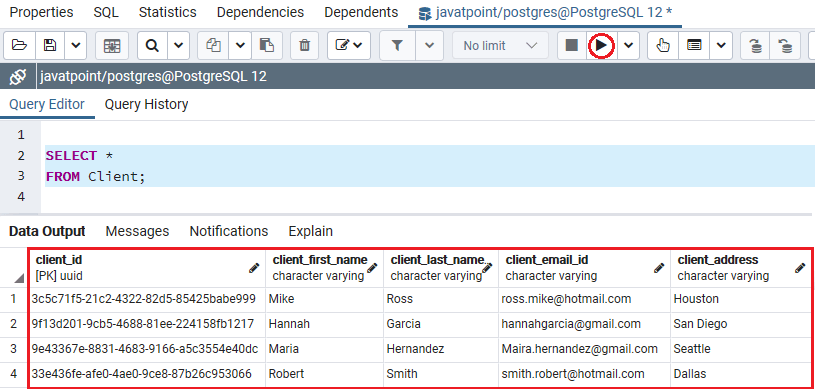
Plpgsql | 1. ~ (master)]# sudo -u postgres psql -dbname=idempiere This usually indicates that the uuid extension is missing from the database. Where: PL/pgSQL function generate_uuid() line 3 at RETURN You might need to add explicit type casts. ** : ERROR: function uuid_generate_v4() does not exist Hint: No function matches the given name and argument types. I've not tried it myself, so, "no strings attached".When I try to add a new client in idempiere I get the following error message: idempiere Version=7.08290007
#CHROME EXTENSION UUID GENERATOR POSTGRES MAC#
This, somehow, makes the MACs not as unique as you probably thought.Īlternatvies: If you work with Windows, may be this tool can let you fake a MAC address. so, the MAC are actually completely (pseudo)random.Īs pointed out by I also think you're better off with v4 UUIDs, I don't think you'll get less collision risk with a randomly generated MAC.īesides, very many network devices (routers, switches, etc.) have programmable MAC addresses (this is very handy when you want to replace one broken device by another, and make sure all the other devices don't notice any difference at all). but can be very easily tested: SELECT uuid_generate_v1mc() AS u1, uuid_generate_v1mc() AS u2 Whether this random value is always the same for a specific machine (which wouldn't look very random to me) or is just purely (pseudo)random and changing every time, is not clear from this explanation. If it follows the RFC, the function(s) must either use any of the MAC addresses available in your system, or a random one (with a specific bit set). I don't think you actually can specify a MAC address to the PostgreSQL function.

The multicast bit is just one of the bits from the node part of a UUID (for all practical purposes, this just forces one specific bit of the UUID to be set). If I interpret this correctly, I'd say: a random Multicast address is any randomly generated MAC adress which has just the multicast bit set. The multicast bit mustīe set in such addresses, in order that they will never conflict with Generated value may be used see Section 4.5. Currency Converter Widget - Exchange Rates. Currency conversion extension for Google Chrome and Edge browser that is based on the Chromium open-source project. Unicast/multicast bit, and is the first octet of the addressįor systems with no IEEE address, a randomly or pseudo-randomly Easily fill text fields with a randomly generated UUID. Octet (octet number 10) contains the global/local bit and the For systems with multiple IEEEĨ02 addresses, any available one can be used. RFC4122 documentation ( section 4.1.6) specifies:įor UUID version 1, the node field consists of an IEEE 802 MACĪddress, usually the host address. Is this some other MAC currently in use being found on the db server’s local network? I have googled/binged but found no good explanation. My question is: What exactly is this “random multicast MAC address” to be used in place of the db server’s own MAC? So instead we want to use another alternate MAC address in its place as a part of generating a Version 1 UUID value. I assume the intent here is to address a security concern about recording the MAC address of the database server. ALTER TABLE tabletoalter ALTER COLUMN tableid DROP DEFAULT, 7.

the default INT value is not compatible with the new column type. Dropping and recreating the default column value is required because. This function generates a version 1 UUID but uses a random multicast MAC address instead of the real MAC address of the computer. CREATE EXTENSION IF NOT EXISTS 'uuid-ossp' 3. The uuid-ossp module extension (plugin) for Postgres offers this alternative method for generating a UUID value.


 0 kommentar(er)
0 kommentar(er)
